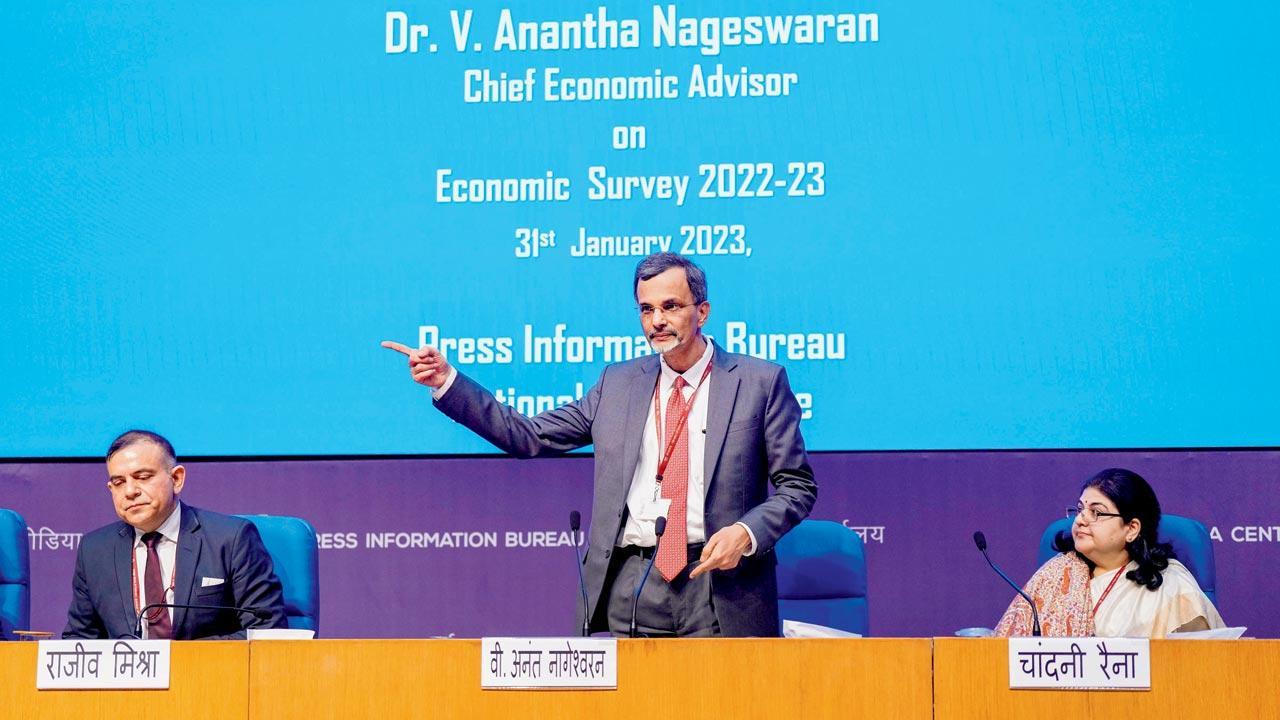Economic Survey predicts 6pc-6.8pc growth, down from 7pc forecast for FY 23

Chief Economic Adviser V Anantha Nageswaran speaks after presenting the Economic Survey 2022-23, in New Delhi on Tuesday. Pic/PTI
India forecast economic growth of 6 per cent to 6.8 per cent in the 2023-24 fiscal year, slowing from the 7 per cent growth projected for the current year ending on March 31, as a global slowdown is likely to hurt exports.
ADVERTISEMENT
The finance ministry released its annual Economic Survey and Finance Minister Nirmala Sitharaman presented it to parliament on Tuesday, a day before she is set to unveil the government’s budget for the coming fiscal year.
The economic growth forecast for 2023-24 is higher than the International Monetary Fund’s projection of 6.1 per cent , as the finance ministry expects the global weakness will be partially offset by strong domestic demand.
The report, prepared by Chief Economic Adviser V Anantha Nageswaran, said its baseline scenario was for 6.5 per cent growth in 2023-24, which would still make India one of the fastest growing economies.
Also Read: Union Budget 2023 to incorporate every section's expectations: MoS Finance
For India, on balance, a modest slowdown in global growth would be beneficial as it would help bring down commodity prices and ease inflation concerns, Nageswaran said.
India’s economy has rebounded since the COVID-19 pandemic. But the Russia-Ukraine conflict has triggered inflationary pressures and prompted central banks, including India’s, to reverse ultra-loose monetary policy adopted during the pandemic.
The survey said inflation was not high enough to deter private consumption nor low enough to weaken investment, even though it remained above the central bank’s target range of 2 per cent to 6 per cent through much of 2022/23.
Demand in the economy will remain “brisk” in 2023/24 as “a vigorous credit disbursal and capital investment cycle is expected to unfold in India with the strengthening of the balance sheets of the corporate and banking sectors,” the survey said.
However, this could mean that the current account deficit might stay high, because a strong domestic economy would support imports while exports were expected to ease due to weakness in foreign markets.
This story has been sourced from a third party syndicated feed, agencies. Mid-day accepts no responsibility or liability for its dependability, trustworthiness, reliability and data of the text. Mid-day management/mid-day.com reserves the sole right to alter, delete or remove (without notice) the content in its absolute discretion for any reason whatsoever
 Subscribe today by clicking the link and stay updated with the latest news!" Click here!
Subscribe today by clicking the link and stay updated with the latest news!" Click here!







